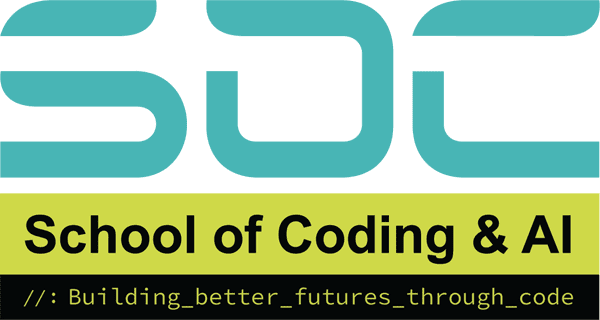SOC Research Centre
Where Tech Meets Real-World Change
At School of Coding & AI, our research focuses on applying technology to solve real-world challenges across education, health, entrepreneurship, business, and environmental sustainability.
Through active participation in over 27 international research projects, including those funded by Erasmus+, Horizon Europe, and other global bodies, we have delivered impactful work in areas such as inclusive digital education, AI in healthcare, female entrepreneurship, circular economy, and green skills development. Our Birmingham-based ‘The SOC International AI Research Lab’ acts as a collaborative hub, connecting researchers, students, and industry to pilot scalable, tech-driven solutions.
We work closely with UK and international universities in 17 different countries, NGOs, and public sector organisations to co-create knowledge that drives economic and social progress. Whether it’s developing new AI tools for classrooms, exploring pathways to net-zero through tech innovation, or enhancing business resilience in underserved communities, our research is always grounded in impact, access, and equity. We welcome partners who share our vision for innovation that is inclusive, sustainable, and globally relevant.
Provost (Chief Academic Officer, Research and Business Development Lead)
For more than 35 years at Birmingham City University (BCU), Mak has provided leadership to 4 highly successful departments with annual incomes in excess of £10m. During this time Mak has combined his knowledge of electronic engineering, computer science, and business to lead the development and delivery of over £14m worth of enterprise projects, related to computer networking, IoT, data analytics, AI, logistics, optimisation, and the teaching and training of healthcare professionals.
In addition, Mak has an international reputation for his extensive work on the use of Vendor Resources and embedding these into various qualifications to support students into further study and jobs. He has continually worked to engage with 10 of the largest tech companies such as Cisco, Microsoft, SAS, Oracle etc… to provide a rich set of problem-based learning throughout computing, communications, engineering, business and health courses. These courses have been the basis of the collaborative work with the MoJ, industry and commerce. During this work, he has travelled extensively and supported many African and Asian countries, which also includes supporting research and enterprise projects.
This leadership in education has earned him his professorship, a range of invited roles and the Olympic torch bearer for the 2012 UK Olympics – Mak dedicates the honour of the torch to his Cisco colleagues who nominated him, and to his Cisco team at BCU.
Regarding research, Mak has co-edited a book and co-authored more than 25 publications, including book chapters on a range of topics such as computer science education, healthcare and dementia. Mak is currently involved in leading, organising and publishing in IEEE International Conferences and journals (IEEE, IGI and Springer). However, his main passion is in the use of technology-enhanced living to support those patients with mental health, dementia and generally old age.
In 2023, Mak was appointed Dean of Business Development at Global Banking School a private HE provider, which is a part of the Global Education Group (GEDU). Here, he supported the development of new courses, employability and partnerships. In Sept 2025 Mak was appointed the Provost (Chief Academic Officer) at the School of Coding & AI, a private HE provider, where he now leads on all academic strategy, research and enterprise and both national and international business development.








